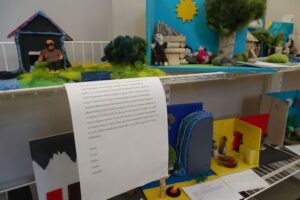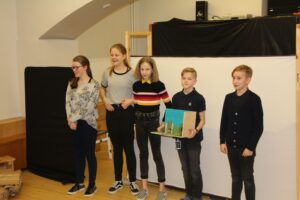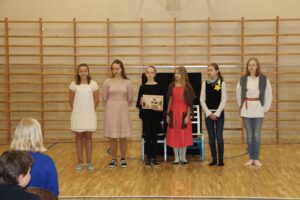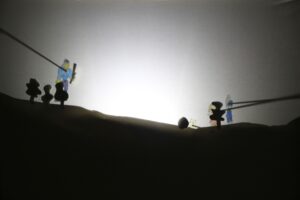Form 5 Interdisciplinary Drama Project
The Theatre Day, when Form 5 students present their drama projects, is part of the Drama Course included in the school curriculum and aimed at developing students’ creativity, self-expression, communication skills, self-regulation and entrepreneurship. Every spring at the end of the school year, a public performance is held where students showcase their mini-productions and stage models created in groups. This is the result of a year-long collaboration between teachers of Drama, Estonian language, Art, Music, Handicrafts, Technology and IT.
The entire process is based on cross-curricular topics set forth in the National Curriculum for Basic Schools. The Drama project enables students to understand, interpret and act out their chosen piece of literature in more depth and fosters cultural identity. At the core of the learning process is group-based co-creation. Groups of 4–6 students design a creative product, develop it into a play and present it to other students. Every student finds a suitable role in the group. Emphasis is placed on developing co operation in the group, taking responsibility for joint effort and in front of teammates, and simply taking joy in the process. What matters is not artistic ability, but self-expression and argumentation skills.
The learning process is as follows.
- Firstly, Form 5 students read the necessary work of literature. In their Estonian language classes students form small groups and select their favourite chapter or part of the text and write a dramatization of it.
- Based on the dramatizations, students create stage model designs in their Art classes and construct the models in the Handicrafts and Technology classes. The stage models include visual or audio elements created with Microbit computers. After completing the stage models, students present them to their classmates in Technology and Handicrafts classes and analyse their work.
- In Music classes, students learn and perform pieces of music connected to the work of litereature.
- In IT classes students create a shared folder where they compile all the documents they have completed during the project: the dramatization and scanned images of the stage model designs. Students design and create programmes for the performance, which are shared with the audience on Theatre Day using a QR code. In classes students revise programming Microbit microcomputers, which they have learnt in Forms 3 and 4, and learn to use motors to add a visual or audio element to their stade models that they have made in their Technology and Handicraft classes.
- Each group creates a mini-production in Drama classes, taking care to make the necessary decorations and stage props.
- Groups present their plays to Form 4 students, who watch around ten performances and give written feedback. Form 5 students watch and give feedback on the performances of their peers in parallel classes, justifying their evaluation in the light of the theatrical knowledge they have gained over the year.
- The Theatre Day is followed by an analysis where students reflect on their own as well as their teammates’ experience and formulate what they have learnt from the process.
In the 2018–2019 academic year the work of literature chosen was Eno Raud’s “Kalevipoeg”. The plays were stylistically diverse, featuring puppetry and shadow theater as well as traditional theater. Students made use of various technological solutions to enhance their plays, which opened up new opportunities. The QR codes showing the programme of the Theatre Day were displayed on the walls. The performances were held in two halls simultaneously for about one and a half hours. The audience consisted of parents and Form 4 students. The Basic School Student Council set up a theatre café especially for visitors and sold pastries and delicacies made by themselves.



